8 Questions I Get Asked About Poland
I just got back from Poland and it was a mix of emotional highs and lows. Here are the top questions I get asked about the trip.
Happy New Year!
I hope you celebrated in a way that made you feel reflective and grateful.
This Drop is dedicated to my older brother whose birthday is today. I point out the fact that he’s older not because he in fact is another year older today, but because I’m lucky I have him to look up to (he’s tall, too! okay enough dad jokes). Speaking of dads, he just became one, and he’s already doing a fantastic job at it. Happy birthday, Mickey. 🥳🎈
📚 Don’t forget: virtual book club this Sunday! We’ll be discussing Uncomfortable Conversations with a Jew.
So… Poland. What brought you there? Did you go on a Jewish tour?
That is a really good guess, but no. I went for a friend’s wedding, which was based in Krakow. Then I traveled around with a dear friend who I met on a Jewish trip to India years ago through JDC Entwine! So you can imagine how special it felt to create our own Jewish trip, like A Real Pain: The Sequel. I was Kieran Culkin, for those wondering.
Both of our great-grandmothers were from the Warsaw area, so we wanted to experience what was once the largest Jewish community in the world. We started in Krakow, where we celebrated Chanukah with the beautifully vibrant JCC. Then we spent New Year’s in Zakopane, a ski town in the mountains, and ended in Warsaw.
Was the food good?
Ah… the most important travel question! For the first few days, yes! I’m talkin’ buttery pierogi stuffed with potatoes and cabbage, potato pancakes smothered in a mushroom cream sauce, chewy smoked sheep milk cheese with cranberry sauce, and this street food that resembled French bread pizza but with mushrooms and garlic sauce. It was all heavy and comforting, the kind of food that leaves you craving a vegetable.
Then we got pretty tired of it by day four. But, hey, nothing a little vodka or mulled wine can’t wash down, eh?
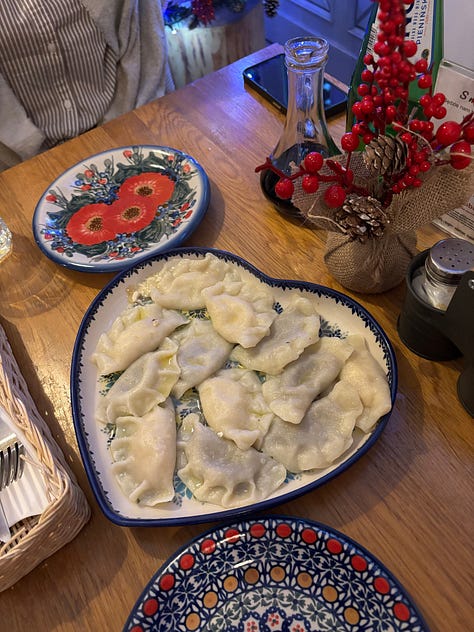

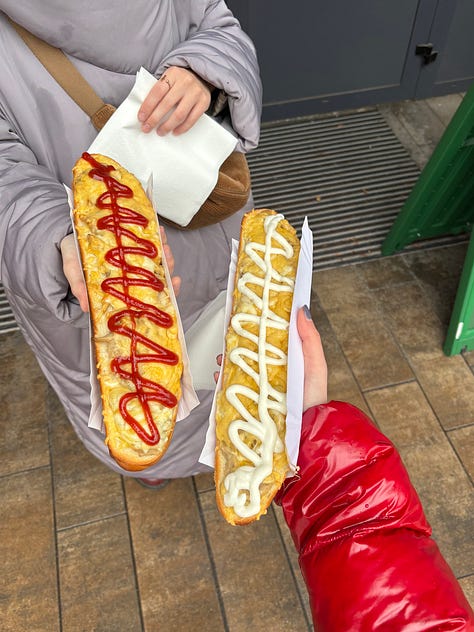


Was it creepy?
I’m going to assume this question is due to its complicated history. Though walking by endless gray Soviet-style buildings in the dead of winter wasn’t doing it any favors. It was just like this video (I’m aware that’s Moldova) but with the occasional Christmas market!
It was only creepy when history came at you full speed ahead and smacked you in the face unexpectedly.
Here’s the best way to sum up the trip: One day you’re dancing with sausages by a bonfire in the mountains. Then the next, you’re back in the city, walking past a plaque that says, “Here is a square where Nazis shot 50 nurses.” Woah.
The creepiest thing that happened was when my friend and I were walking around Warsaw. We walked past a grand palatial building, and I said, “I can’t help but imagine that building used to have Nazi banners hanging from it, like in the old photos, you know? But maybe that was more in Germany.” The next day at the Warsaw Uprising Museum, I saw a photo of that exact building with Nazi banners hanging from it. The caption next to it said they renamed the square it was in to “Adolf Hitler Platz.”
Another moment that was not as creepy but eerily synchronous and sad was in Krakow. At a vintage shop, I really liked this one tall cobalt enamel container used as a vase. Then at Auschwitz, in one of the rooms displaying a huge pile of prisoners’ belongings, from pots and pans to crutches, lay that very same style of container. It stood out to me above everything else, like the girl in the red coat in Schindler’s List, and humanized the victims of the Holocaust all the more.
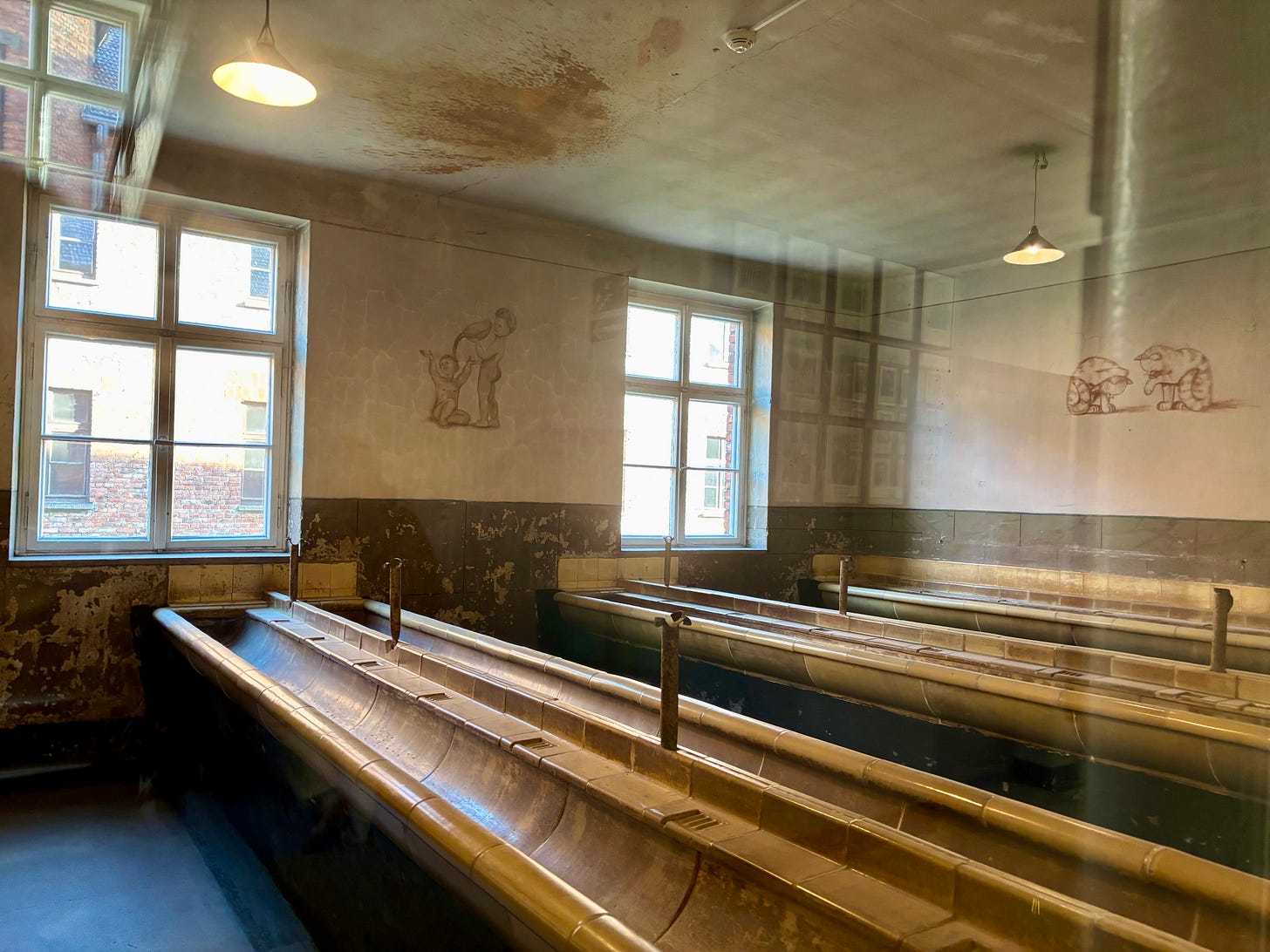
What was Auschwitz like? Did you cry?
Shoutout to my friend Jared who used to be a tour guide in Krakow, and who warned me of the stark differences between Auschwitz and Birkenau. The main difference is that Auschwitz was turned into a museum and some parts were renovated, while Birkenau was left untouched.
Because of this, Auschwitz at least felt somewhat sterile. Our tour guide threw tons of information our way, not letting us absorb anything (just like in A Real Pain!). And I also felt like because this is something I’ve read about my whole life and have seen it in movies, it felt so familiar to me.
Birkenau was another story, for the way it was left untouched after the Nazis abandoned ship when they knew the Soviets were on their way to the camps. I had no idea the Nazis left explosives by the gas chambers and crematoria to hide their crimes, so those buildings were left in ruins and rubble, as you can see in the photo above.
Still, I didn’t cry. Maybe because I was too angry at the keffiyeh-wearing imbecile in my group who held us up because he needed to buy coffee at the Auschwitz café. I hope he learned something at least.
What surprised you the most?
How much Polish people love the Macarena. Seriously! Not just at events with dancing, but we even heard someone blasting it in their car. I can’t wait for 2052 when they finally learn about Chappell Roan.
A surprise was how few Jews there were at Jewish sites. You could just tell. I think it’s because the Jewish history sites are the thing to do here. That, and the salt mine. I’m so used to seeing photos of Jewish groups tour Auschwitz with Israeli flags, but nope, we only had the privilege of touring it with Keffiyeh Karl.
In New York, it’s only Jews who go to the Jewish museums, but in Warsaw? It was a culture shock seeing people of all ages and backgrounds intently learning about 1,000 years of Polish Jewish history.
Take this pic for example: These teens below were learning about Zionist leaders from history and were not calling for a walkout, a boycott, or to their mother in tears. What a breath of fresh air!
What surprised me most throughout the trip were the questions people were asking on tours. Questions like:
Why were the Jews persecuted? Was it because they were a minority?
If things got so bad, why didn’t they leave?
What happened to the Nazis after the war?
These are questions I grew up learning in depth. How could they not know? Though, to be fair, people write books trying to answer the first question, my favorite being Why the Jews? by Rabbi Joseph Telushkin, so you know its complex.
So of course I got nervous when our tour guide answered that first question with the short answer of “Jews were blamed for killing Jesus.” Yes, this is how early anti-Judaism spread throughout Europe, but it’s missing the political, social, and economic factors often related to antisemitism, like using Jews as scapegoats during societal crises. And how Jewish oppression differs from other minority oppressions, because history shows that our status in society could change overnight, whereas other oppression statuses relatively stay the same. (I just attended an interesting antisemitism training, so pardon the rant.)
I think that’s my biggest takeaway from this trip: In my Jewish professional bubble here in New York, it’s so easy to take my background for granted and assume everyone has the same level of knowledge as me when it comes to the Jewish stuff.
In prep for Sunday’s Shabbat Drop book club (join us!), I read a sobering reminder that since Jews make up less than .2% of the world population, that means most people on this planet don’t know a Jew. Ironically (or maybe not), I had to go to Poland to realize this.
Bummer! Tell me something funny please.
Here’s a video of me dancing with a sausage:
Do you recommend Poland?
Look, it’s not my favorite European country I’ve ever been to (that award goes to Estonia). Having said that, I think it’s a trip everyone should take in their life. Jew or no, it’s important, impactful, and necessary.
At at time when antisemitism is making a trendy comeback, we all know studying history helps us understand the present… or do we? After this trip, I’m not sure I have a clear idea of what people actually know anymore. The most we can do is learn. Like Keffiyeh Karl.
Shabbat Shalom. Thanks for reading.
P.S. How awesome is this: we met a Shabbat Drop reader in Warsaw! So cool meeting Internet friends IRL.

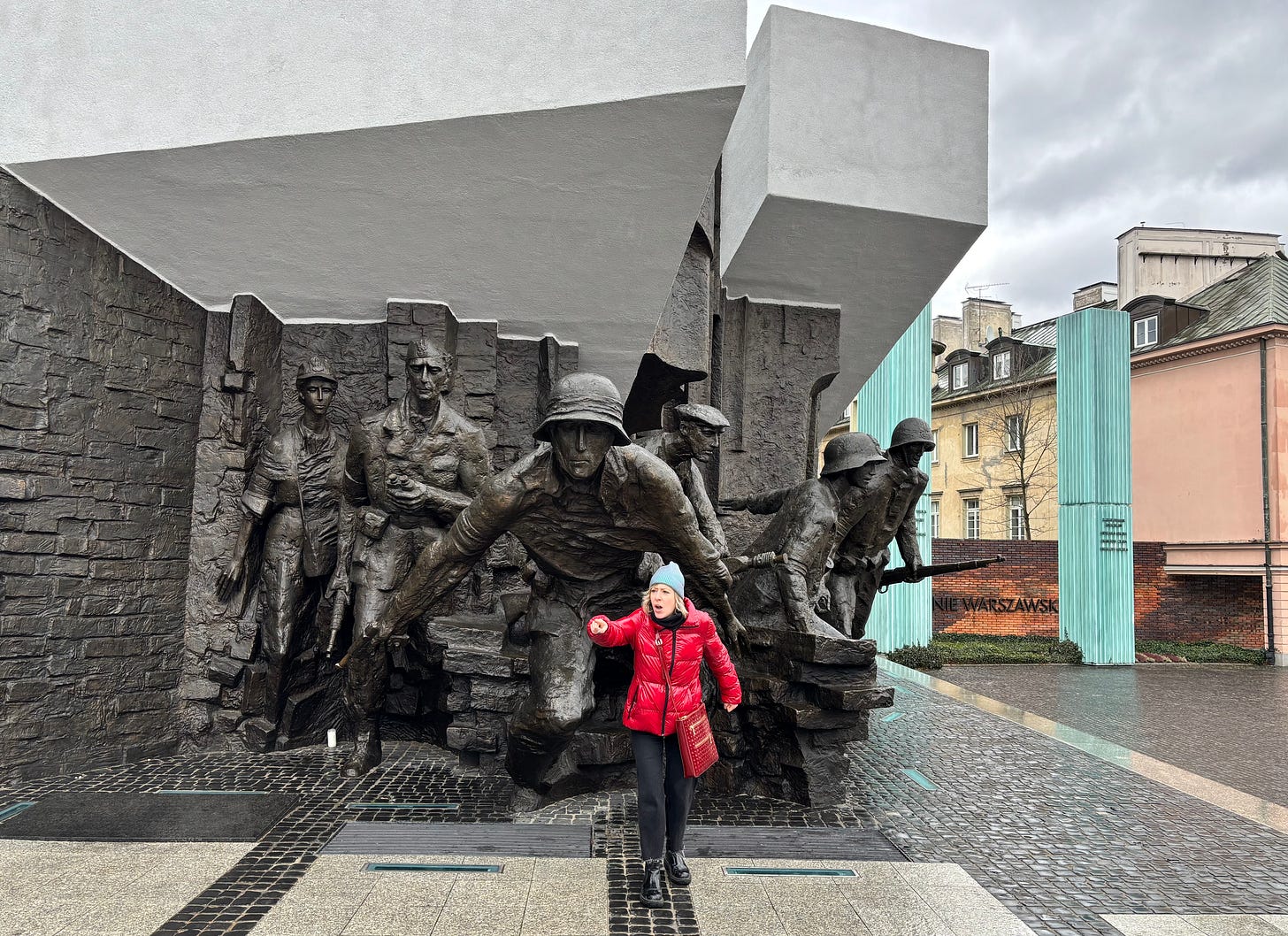
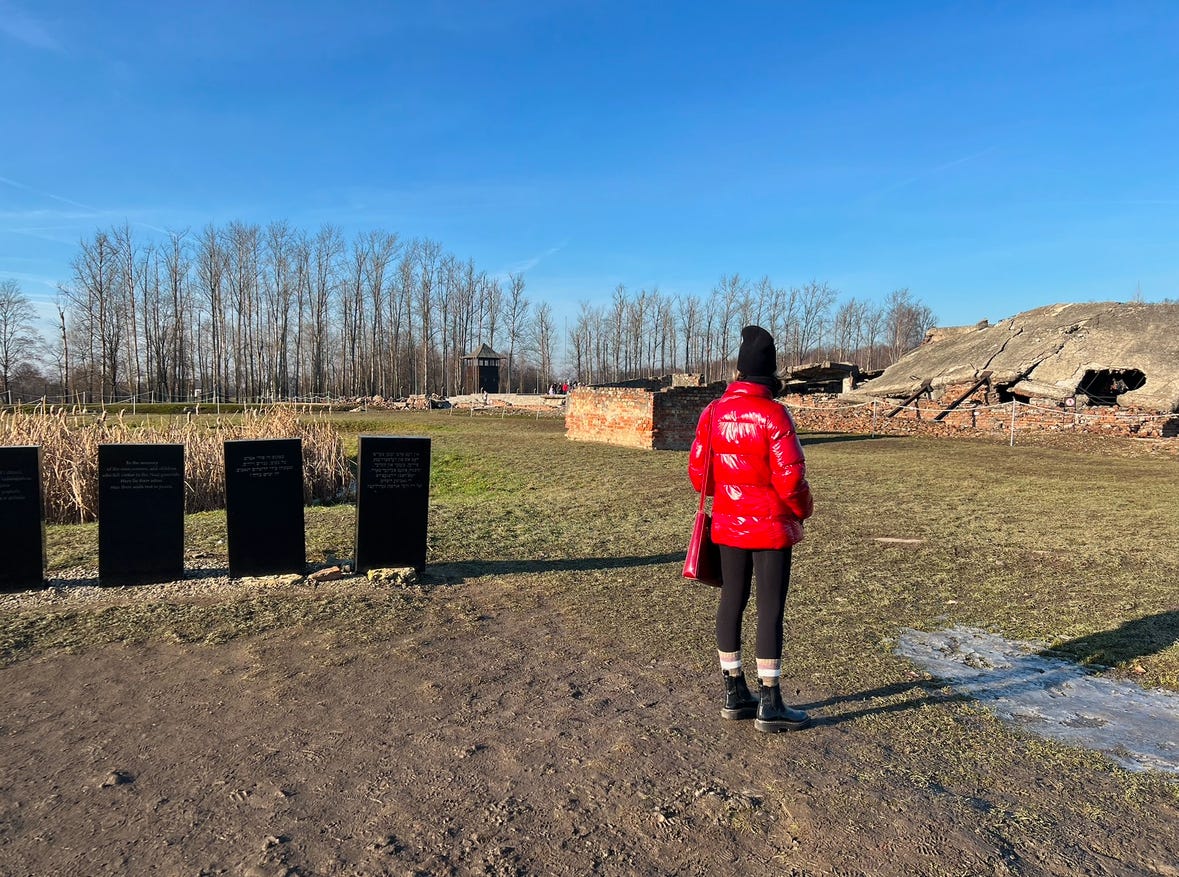


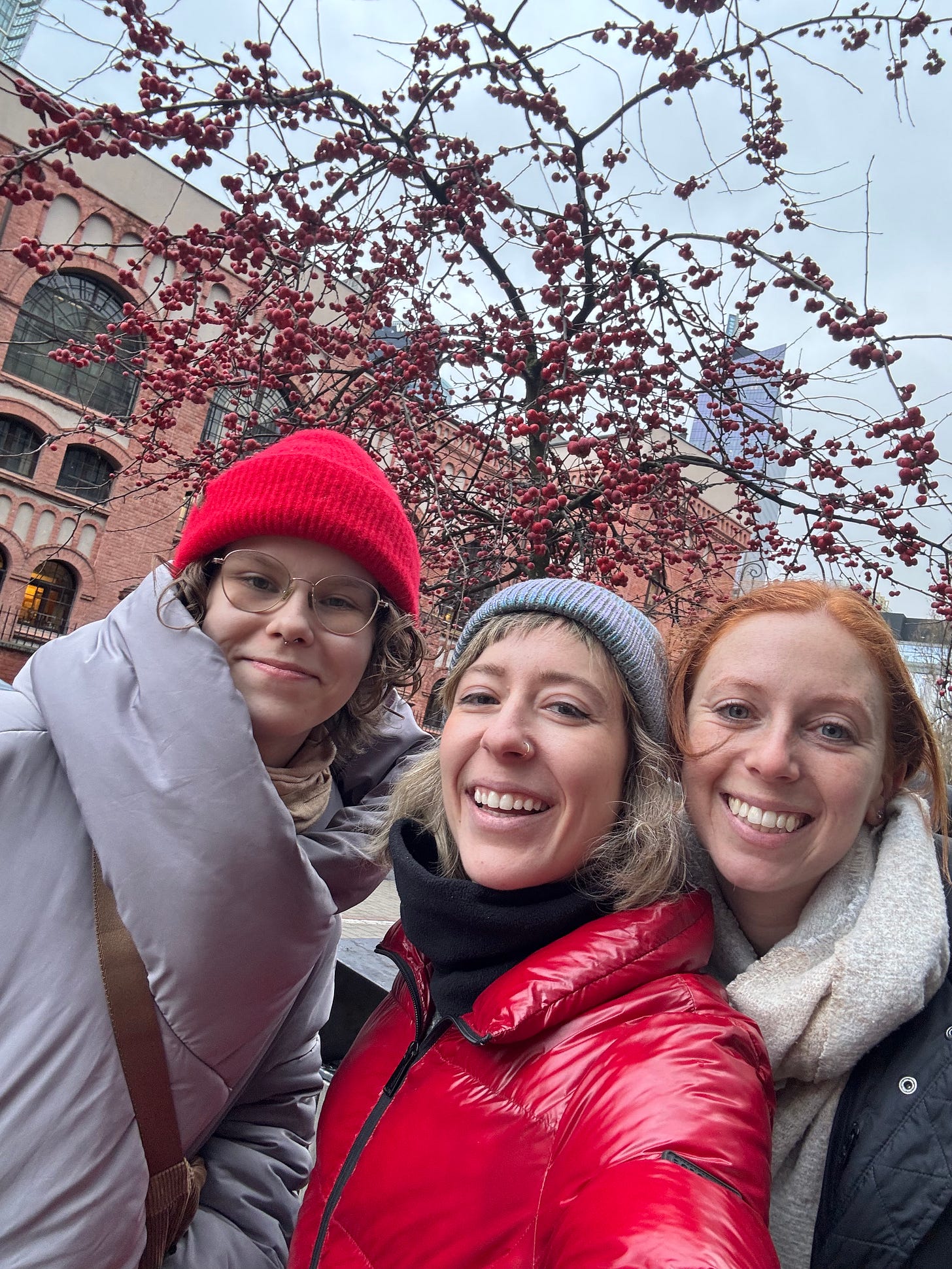
just realised i never sent my comment to this post! it was so incredible and meaningful meeting irl - thank you for the opportunity 🙌🏻 also, as someone living here, Poland is also, in fact, not my favorite European country I’ve ever been to lol!
I’m in Sharm el Sheikh. The last time I was here (1972) it was still part of Israel. Last week we hired a driver in Luxor; a lovely man who was Christian and told me that he gets no work because he is persecuted by the Muslims. I don’t advertise being Jewish, especially in Egypt, but I felt safe with Mena. I asked him if he knew any Jewish people. He googled it and said, “ I love the Moses people“! He said that his father and grandfather were very sad when land was given back to Egypt.
* so anyone needing a great driver in Luxor, please let me know!